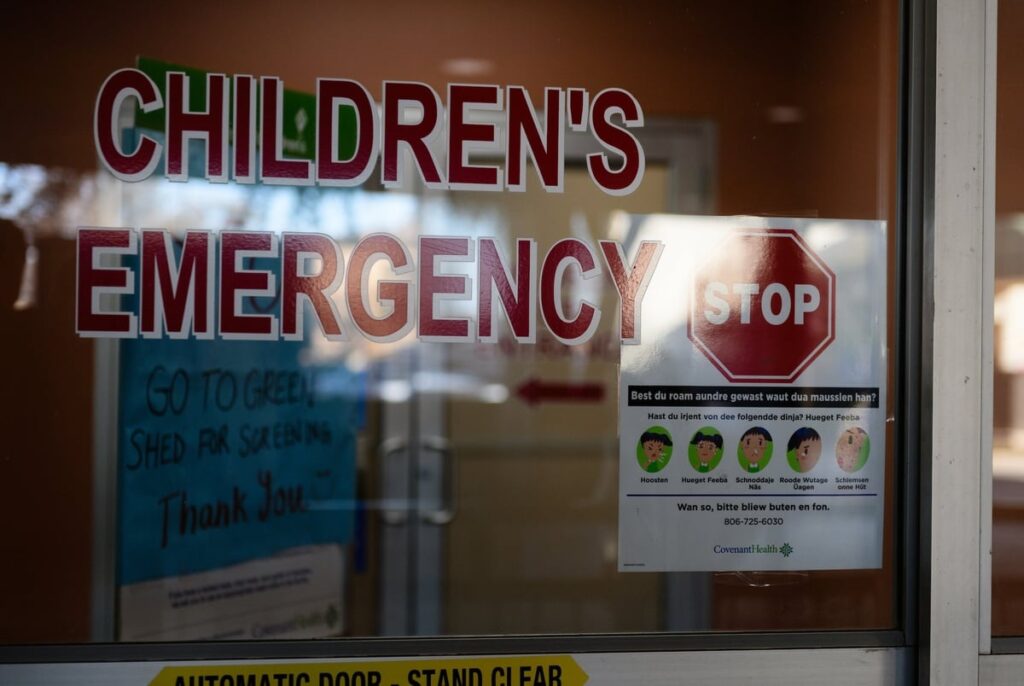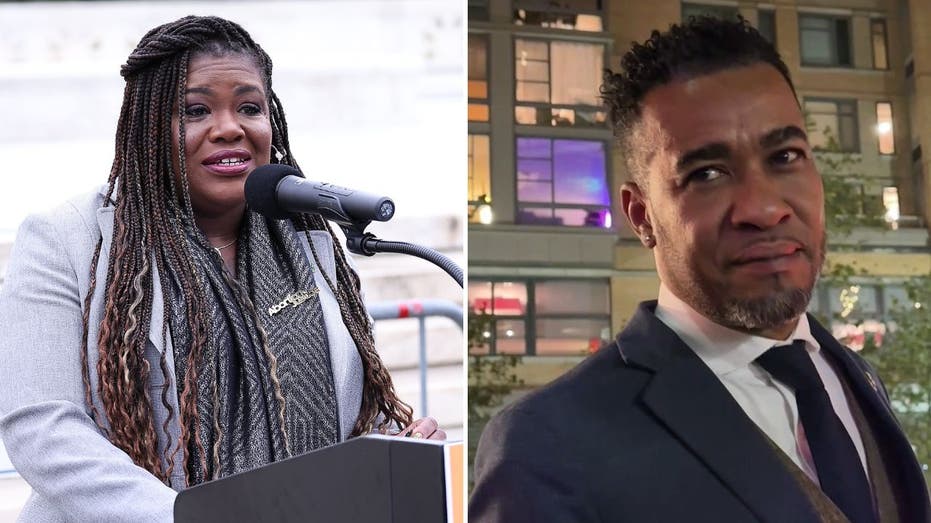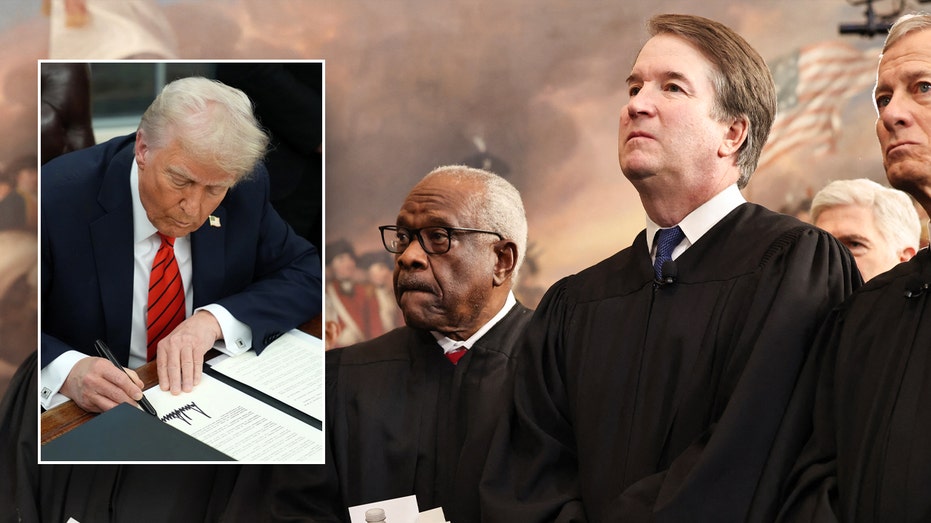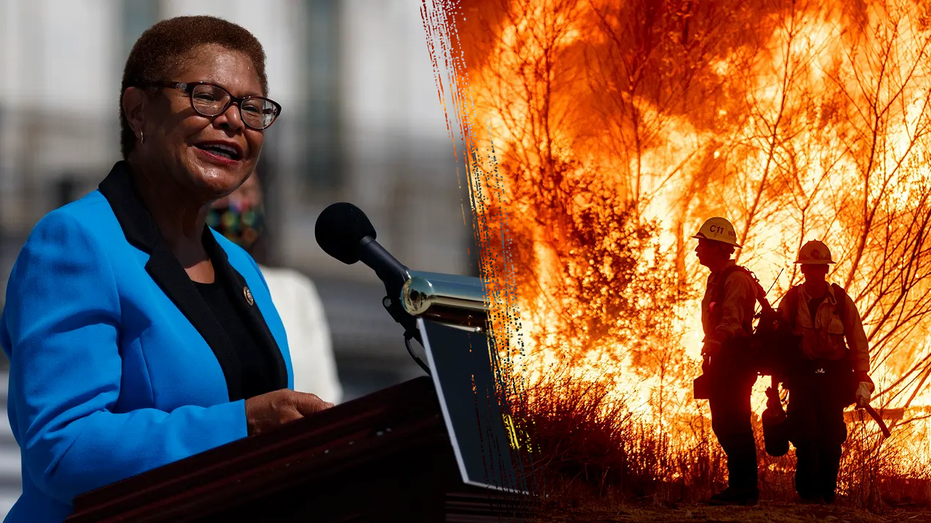THIS country is world’s happiest country for 8th time straight, India stands at…

According to Fortune, the study assesses several variables, including GDP, social support, health, freedom, generosity, and perceptions of corruption, to calculate the happiness levels of 147 nations.
Texas parents of child who died of measles urge others not to vaccinate

The couple, members of the Mennonite community in Gaines County, were interviewed by the anti-vaccination group Children Health Defense.
Husband of former ‘Squad’ Rep. Cori Bush charged with wire fraud linked to COVID relief funds: DOJ

The husband of former U.S. Rep. Cori Bush, a Missouri Democrat, has been charged with defrauding the government after allegedly accepting $20,000 in payments from the pandemic-era Paycheck Protection and Economic Injury Disaster Loan programs, the Justice Department said. Cortney Merritts, 46, of St. Louis, falsified details about his purported businesses to obtain loans from the Small Business Administration in 2020 and 2021, federal prosecutors said Thursday. He was charged with two counts of wire fraud. CORI BUSH’S CAMPAIGN PAYS $17,500 MORE TO HER HUSBAND, BRINGING HIS TOTAL TO $120K, NEW FILINGS SHOW “Mr. Merritts intends to plead not guilty to the charges,” Merritts’ lawyer, Justin Gelfand of Margulis Gelfand DiRuzzo & Lambson, said in a statement. “As with any indictment, this is only the government’s version of the story. We look forward to litigating this case in federal court in Washington, D.C.” Merritts repeatedly applied for business loans for a company he said he operated while also allegedly misrepresenting his revenue and number of people he employed, authorities said. CORI BUSH’S CAMPAIGN CONTINUES TO SHELL OUT THOUSANDS OF DOLLARS TO HER HUSBAND FOR PRIVATE SECURITY One July 2020 application for a loan was rejected because it was nearly identical to one he submitted previously, prosecutors said. Merritts was indicted a year after the Justice Department opened an investigation into Bush, a former member of the “Squad,” over campaign payments to her husband. Bush was defeated in a primary last year amid controversy over her criticism of Israel’s response to the Oct. 7, 2023, attacks on its citizens by Hamas terrorists. The so-called “Squad” Bush formerly belonged to is an informal group of progressive lawmakers in Congress that includes representatives Alexandria Ocasio-Cortez, D-N.Y.; Ilhan Omar, D-Minn.; Ayanna Pressley, D-Mass.; and Rashida Tlaib, D-Mich.
Pentagon set to award US Air Force’s next-generation fighter jet contract, sources say

The Pentagon is set to announce its decision on a next-generation fighter jet contract initially worth more than $20 billion as soon as Friday, despite earlier concerns about budget constraints and shifting priorities, sources briefed on the plan said. The Next Generation Air Dominance (NGAD) program will replace Lockheed Martin’s F-22 Raptor with a fighter built to battle alongside drones. CONVICTED PENTAGON LEAKER JACK TEIXEIRA FACES COURT-MARTIAL WHILE ALREADY SERVING 15-YEAR SENTENCE Lockheed and Boeing are competing head-to-head for the winner-take-all engineering and manufacturing development phase contract worth more than $20 billion. An Air Force spokesperson and Boeing and Lockheed representatives did not immediately respond to requests for comment. The winner of the high-stakes contest will receive hundreds of billions of dollars in orders over the contract’s lifetime, underpinning their businesses for decades. NGAD was conceived as a “family of systems” centered around a sixth-generation fighter jet that aims to provide the United States with advanced air dominance capabilities to counter near-peer adversaries like China and Russia. Under President Donald Trump’s administration, which took office in January, the program has moved forward after a period of uncertainty that cast doubt on the future of the next-generation fighter jet. Last year, the program faced potential delays or scaling back due to budget pressures and cost overruns in other Air Force programs. There were also discussions about reconsidering fundamental design elements or shifting resources to unmanned drone programs. The anticipated announcement signals designs that were finalized last year will be chosen for NGAD. Boeing has suffered headwinds for both its commercial and defense businesses. A win would be a shot in the arm for its St. Louis, Missouri, fighter jet production businesses, while a loss would add to Boeing’s woes. Lockheed was recently eliminated from the competition to build the Navy’s next-generation carrier-based stealth fighter. If it loses the NGAD contract, it will likely double down on its F-35 fighter jet program and international sales of its F-16 jets.
Trump demands Supreme Court step in after federal judges block his agenda: ‘These people are Lunatics’

President Donald Trump on Thursday called on the Supreme Court to reverse injunctions placed on his administration’s efforts to carry out mass deportations and other moves to downsize the scope of government. In a lengthy post on his Truth Social platform, Trump took aim at “Radical Left Judges” for imposing injunctions on some of his most controversial moves, such as deporting Venezuelan gang members. “Unlawful Nationwide Injunctions by Radical Left Judges could very well lead to the destruction of our Country!” he wrote. “These people are Lunatics, who do not care, even a little bit, about the repercussions from their very dangerous and incorrect Decisions and Rulings.” WHO IS JAMES BOASBERG, THE US JUDGE AT THE CENTER OF TRUMP’S DEPORTATION EFFORTS? A president has to be allowed to act “quickly and decisively,” such as “returning murderers, drug lords, rapists, and other such type criminals back to their Homeland, or to other locations that will allow our Country to be SAFE.” He urged the high court and Chief Justice John Roberts to address the matter. “If Justice Roberts and the United States Supreme Court do not fix this toxic and unprecedented situation IMMEDIATELY, our Country is in very serious trouble!” he wrote. The Trump administration has railed against federal judges for blocking parts of his agenda. On Thursday, a federal judge said that Columbia University doesn’t have to give the House Education and Workforce Committee the information it had requested about student disciplinary actions until after a hearing scheduled for Tuesday. CLICK HERE TO GET THE FOX NEWS APP U.S. District Judge James Boasberg drew the ire of the Trump administration after he blocked it from using a 1798 law to deport Venezuelan nationals, including alleged members of the gang Tren de Aragua, for a period of 14 days. He also ordered any flights in the air to return to U.S. soil immediately. On Thursday, Trump said Boasberg was “doing everything in his power” to usurp the presidency. “He is a local, unknown Judge, a Grandstander, looking for publicity, and it cannot be for any other reason, because his “Rulings” are so ridiculous, and inept,” Trump wrote. “SAVE AMERICA!”
Denmark beat sorry Portugal 1-0 in Nations League quarterfinal first-leg

Hojlund came off the bench to net the winner as his side beat Portugal 1-0 in the first leg of their Nations League quarterfinal. Rasmus Hojlund earned Denmark a deserved 1-0 lead over Portugal in their Nations League quarterfinal first-leg clash. The Manchester United forward delivered from the bench to split the teams in Copenhagen on Thursday, providing the finishing touch Denmark previously lacked on a night where they dominated Roberto Martinez’s side. The Spanish coach selected veteran Cristiano Ronaldo, 40, upfront, but the Al Nassr striker was mostly frozen out of the game. Winners of the inaugural tournament in 2019, Portugal are aiming to become the first team to lift the Nations League trophy for a second time. However, they will need to improve swiftly to reach the semifinals as Denmark outclassed them and could have scored more on the night. Looking for their first win under coach Brian Riemer, who was appointed in October, the Danes were without injured captain Pierre-Emile Hojbjerg. Denmark piled on the pressure from the start, with debutant Mika Biereth charging down Diogo Costa’s clearance, but the goalkeeper managed to escape by conceding only a corner. Advertisement Jesper Lindstrom forced Costa into action again with an effort from a distance, while Pedro Neto tested Kasper Schmeichel at the other end. The hosts won a penalty when Portugal defender Renato Veiga handled the ball but Costa produced a superb save to deny Christian Eriksen. The Porto goalkeeper, an expert in saving spot kicks, dived low to his right to thwart the Manchester United midfielder. Eriksen looks dejected after missing a penalty [Michael Barrett Boesen/GocherImagery/Future Publishing via Getty Images] Costa made another stunning save from Biereth to keep his team level, as Denmark turned the screw. When the hosts finally beat Costa, Diogo Dalot was in the right place at the right time to clear Eriksen’s effort off the line just before the break, after good work by Gustav Isaksen. Riemer’s side stayed on top in the second half, with Costa saving an Eriksen free kick, although Vitinha came close for Portugal, who showed occasional flashes of their quality on an otherwise lethargic display. Isaksen, a constant menace for Denmark, had a shot deflected behind as Denmark started to fear their dominance would not translate into a lead. However, Hojlund, on as a substitute, had other ideas. The striker, who ended a long Manchester United drought last weekend by scoring in his team’s win at Leicester City, broke the deadlock by slotting home to cap a fine move. Eriksen spread the ball to another substitute, Andreas Skov Olsen, who picked out Hojlund with a low ball to finish coolly in the 78th minute. Advertisement Portugal’s Bernardo Silva, making his 99th appearance for his country, had a penalty appeal late on waved away after falling under pressure from Patrick Dorgu in the box, and Schmeichel saved from Neto in the final stages. Portugal host Denmark in the second leg in Lisbon on Sunday, with the winner playing either Germany or Italy in the semifinal. Germany came from behind to defeat Italy 2-1 at the San Siro on Thursday in the first leg of their Nations League quarterfinal, with Leon Goretzka heading the winning goal 14 minutes from time. European champions Spain salvaged their two-year unbeaten streak in the dying minutes of their quarterfinal first leg, denying 10-man Netherlands a famous victory with a 2-2 draw. Mikel Merino broke Dutch hearts in the third minute of added time, to maintain an unbeaten run that now stretches to 22 competitive games. Meanwhile, Ivan Perisic scored one goal and made another as Croatia beat France 2-0 on Thursday to seize the upper hand in the first leg of their quarterfinal tie. Adblock test (Why?)
Japan first team to qualify for 2026 World Cup after victory over Bahrain

Japan ensure a top two finish with 2-0 win against Bahrain in Group C of Asia qualifiers for 2026 World Cup. Japan became the first team to qualify for the 2026 World Cup after beating Bahrain 2-0 at Saitama Stadium. Second-half goals from Daichi Kamada and Takefusa Kubo ensured the Samurai Blue secured a spot in Asia Group C’s top two automatic qualification places. At its eighth straight World Cup, Japan joins co-hosts the United States, Canada and Mexico in the expanded 48-team tournament. “Thanks to the players for their efforts and the fans for their support,” Japan coach Hajime Moriyasu said. “We knew that if we persevered that the goals would come. We will try and win our three remaining games and grow as a team.” Japan players celebrate with coach Hajime Moriyasu after qualifying for the 2026 World Cup [Kim Kyung-Hoon/Reuters] Earlier, second-place Australia took a big step toward a seventh appearance by defeating Indonesia 5-1 in Sydney in the visitors’ first game under new coach Patrick Kluivert. Indonesia’s Kevin Diks missed a penalty in the eighth minute, and 10 minutes later Martin Boyle converted his spot kick to put the Socceroos ahead. Advertisement Nishan Velupillay and Jackson Irvine scored before the break and Lewis Miller made it 4-0 on the hour. Ole Romeny scored for Indonesia before Irvine grabbed his second and the hosts’ fifth. The top two from each of the three six-team groups in the third round of Asian qualifying advance to the World Cup, while the third- and fourth-place teams advance to another stage to compete for two more places. Adblock test (Why?)
LA Mayor Bass’ former rival reveals why he is opposed to her recall campaign

Former Los Angeles mayoral candidate Rick Caruso is not backing the recall effort against Democratic Mayor Karen Bass, his former opponent. “A mayoral recall right now is not a good idea. This is a time when Los Angeles needs unity, not costly and expensive political distractions,” he posted on X earlier this week. “We must rebuild our communities, get people back into their homes, and open businesses that have been closed or lost. That must be our total focus. There is a time and place for politics, but it is not now.” The effort to remove Karen Bass from office kicked off after intense criticism of her response to the fires that destroyed thousands of homes and businesses in the Pacific Palisades, including from Caruso, a Democrat. KRISTIN CROWLEY APPEALS LOS ANGELES MAYOR’S DECISION TO TERMINATE HER AS LAFD CHIEF Bass was in Ghana when the fires began despite a prior weather warning, for which she has since expressed remorse. But she has stopped short of stepping down. She also recently sacked the city’s fire chief, Kristin Crowley, who failed to get her job back after appealing. Caruso, a real estate mogul, ran against Bass in 2022 and lost, and it’s unclear if he plans to run against her again in 2026. His decision not to support the recall caught the attention of former Robert F. Kennedy Jr. vice presidential pick Nicole Shanahan, a major supporter of the recall. “Don’t people deserve accountability?!” she said in reply to his post on X. “I don’t see this as political division… I see this as LA being the most united I’ve ever seen it around the real cost of mismanagement. The recall team is [100%] bi-partisan.” GWYNETH PALTROW CONFESSES LA FIRES CAUSED HER TO DRINK ‘EVERY NIGHT’ “People want competency in their leadership,” Caruso responded. “But a recall election doesn’t happen overnight. It would run into June’s primary and cost the city millions we don’t have. Let’s be smart about how we move the city forward.” The disagreement led to a mix of opinions on the recall itself. “’Cheaper to keep her’ is that really your argument? Recalling her forthwith will likely be cheaper than keeping her in place (see: recent $200 billion fire that destroyed my family home). Shouldn’t this be up to the voters and not you anyway, Rick?” Tranquility AI co-founder Dave Harvilicz posted. “Disagree Rick. [Karen Bass] poses a clear and present danger to LA. She must go immediately,” Biotech entrepreneur Houman David Hemmati posted. “If you don’t want a recall, persuade her to resign. No other options. Sorry.” LOS ANGELES MAYOR KAREN BASS RECALL EFFORT LAUNCHES However, some did agree with Caruso that a recall election would be an uphill battle. “The premise of [Caruso]’s decision not to back a recall (which is correct) is precisely BECAUSE it is the best interest of LA not to waste everyone’s time and energy on recall that is destined to fail and further demoralize voters at the worst possible time,” Los Angeles County GOP Central Committee member Elizabeth Barcohana tweeted. To trigger a recall election, a petition would need signatures from 15% of registered voters in the City of Los Angeles. “This recall is nothing more than another extreme right-wing political stunt designed to divide Los Angeles when we need to move forward,” Doug Herman, a strategist for Bass, told Fox News Digital in a statement when the campaign first launched.
LA Mayor Bass’ former rival reveals why he is opposed to her recall campaign

Former Los Angeles mayoral candidate Rick Caruso is not backing the recall effort against Democratic Mayor Karen Bass, his former opponent. “A mayoral recall right now is not a good idea. This is a time when Los Angeles needs unity, not costly and expensive political distractions,” he posted on X earlier this week. “We must rebuild our communities, get people back into their homes, and open businesses that have been closed or lost. That must be our total focus. There is a time and place for politics, but it is not now.” The effort to remove Karen Bass from office kicked off after intense criticism of her response to the fires that destroyed thousands of homes and businesses in the Pacific Palisades, including from Caruso, a Democrat. KRISTIN CROWLEY APPEALS LOS ANGELES MAYOR’S DECISION TO TERMINATE HER AS LAFD CHIEF Bass was in Ghana when the fires began despite a prior weather warning, for which she has since expressed remorse. But she has stopped short of stepping down. She also recently sacked the city’s fire chief, Kristin Crowley, who failed to get her job back after appealing. Caruso, a real estate mogul, ran against Bass in 2022 and lost, and it’s unclear if he plans to run against her again in 2026. His decision not to support the recall caught the attention of former Robert F. Kennedy Jr. vice presidential pick Nicole Shanahan, a major supporter of the recall. “Don’t people deserve accountability?!” she said in reply to his post on X. “I don’t see this as political division… I see this as LA being the most united I’ve ever seen it around the real cost of mismanagement. The recall team is [100%] bi-partisan.” GWYNETH PALTROW CONFESSES LA FIRES CAUSED HER TO DRINK ‘EVERY NIGHT’ “People want competency in their leadership,” Caruso responded. “But a recall election doesn’t happen overnight. It would run into June’s primary and cost the city millions we don’t have. Let’s be smart about how we move the city forward.” The disagreement led to a mix of opinions on the recall itself. “’Cheaper to keep her’ is that really your argument? Recalling her forthwith will likely be cheaper than keeping her in place (see: recent $200 billion fire that destroyed my family home). Shouldn’t this be up to the voters and not you anyway, Rick?” Tranquility AI co-founder Dave Harvilicz posted. “Disagree Rick. [Karen Bass] poses a clear and present danger to LA. She must go immediately,” Biotech entrepreneur Houman David Hemmati posted. “If you don’t want a recall, persuade her to resign. No other options. Sorry.” LOS ANGELES MAYOR KAREN BASS RECALL EFFORT LAUNCHES However, some did agree with Caruso that a recall election would be an uphill battle. “The premise of [Caruso]’s decision not to back a recall (which is correct) is precisely BECAUSE it is the best interest of LA not to waste everyone’s time and energy on recall that is destined to fail and further demoralize voters at the worst possible time,” Los Angeles County GOP Central Committee member Elizabeth Barcohana tweeted. To trigger a recall election, a petition would need signatures from 15% of registered voters in the City of Los Angeles. “This recall is nothing more than another extreme right-wing political stunt designed to divide Los Angeles when we need to move forward,” Doug Herman, a strategist for Bass, told Fox News Digital in a statement when the campaign first launched.
Judges v Trump: Here are the key court battles halting the White House agenda

The recent wave of preliminary injunctions from federal judges has stymied President Donald Trump’s early agenda in his second White House term, prompting new questions as to how far the administration might go if it opts to challenge these court orders. Federal judges across the country have blocked Trump’s ban on transgender persons serving in the U.S. military, ordered the reinstatement of core functions of the U.S. Agency for International Development, or USAID, and halted Elon Musk’s government efficiency organization, DOGE, from oversight and access to government agencies, among other things. They’ve also temporarily halted deportations, or attempted to, so judges can consider the relevant laws. Combined, the wave of rulings has been met with outrage from Trump administration officials, some of whom said they plan to appeal the rulings to the Supreme Court, if needed. White House press secretary Karoline Leavitt has used her podium to rail against “radical left-wing judges,” who she has alleged are acting with a political agenda to block Trump’s executive orders. “These judicial activists want to unilaterally stop President Trump from deporting foreign terrorists, hiring and firing executive branch employees, and determining the readiness of our troops,” Leavitt said on X, expanding on remarks made Wednesday at a press briefing. LAWSUIT TRACKER: NEW RESISTANCE BATTLING TRUMP’S SECOND TERM THROUGH ONSLAUGHT OF LAWSUITS TAKING AIM AT EOS “They MUST be reined in,” she added. Some of Trump’s supporters in Congress have threatened judges who block the president’s agenda with impeachment, while his critics worry the president’s attacks on the judiciary will collapse the constitutional system, bringing to the fore an impassioned debate over the separation of powers in the Constitution. Here’s a rundown of where things stand. U.S. District Court Judge Theodore Chuang, an Obama appointee, ruled on Tuesday that DOGE’s efforts to dismantle USAID “on an accelerated basis” likely violated the U.S. Constitution “in multiple ways” and ordered the partial restoration of the agency’s functions, including reinstatement of personnel access to email and payment systems. Chuang’s preliminary injunction is believed to be the first to directly invoke Musk himself. It said Musk could interact with USAID employees only after being granted “express authorization” from an agency official, and it blocked DOGE from engaging in any further work at USAID. Hours later, U.S. District Court Judge Ana Reyes issued a preliminary injunction barring the Pentagon from enforcing Trump’s order on transgender persons serving in the military. Reyes, the first openly gay member of the court, wrote in a scathing 79-page ruling that the Trump administration failed to demonstrate that transgender service members would hinder military readiness, relying on what she described as “pure conjecture” to attempt to justify the policy and thus causing undue harm to thousands of current U.S. service members. SHELTERS, JESUS, AND MISS PAC-MAN: US JUDGE GRILLS DOJ OVER TRANS POLICY IN DIZZYING LINE OF QUESTIONING Both rulings are almost certain to be challenged by the Trump administration. In fact, Reyes was so confident that the Justice Department would file an emergency appeal that she delayed her ruling from taking force until Friday to allow the Trump administration time to file for an emergency stay. Reyes wasn’t wrong. Senior administration officials vowed to challenge the wave of court rulings, which they said are an attempt by the courts to unduly infringe on presidential powers. “We are appealing this decision, and we will win,” Secretary of Defense Pete Hegseth said on social media. “District court judges have now decided they are in command of the Armed Forces…is there no end to this madness?” White House policy adviser Stephen Miller said later in a post on X. WHO IS JAMES BOASBERG, THE US JUDGE AT THE CENTER OF TRUMP’S DEPORTATION EFFORTS? Several other high-profile cases are playing out in real time that could test the fraught relationship between the courts and the executive branch, and next steps remain deeply uncertain. U.S. District Court Judge James Boasberg warned the Trump administration on Wednesday that it could face consequences for violating his court order temporarily blocking it from invoking a little-known wartime law to immediately deport Venezuelan nationals from U.S. soil, including alleged members of the gang Tren de Aragua, for 14 days. Boasberg handed down the temporary restraining order Saturday evening, around the time that the Trump administration proceeded to deport hundreds of migrants, including Venezuelan nationals subject to the Alien Enemies Act, to El Salvador. He also ordered in a bench ruling shortly after that any planes carrying these individuals return to the U.S. But at least one plane with migrants deported by the law in question touched down later that evening in El Salvador. “Oopsie, too late,” El Salvador’s president said in a post on X. In the days since, government lawyers citing national security protections have refused to share information in court about the deportation flights and whether the plane (or planes) of migrants knowingly departed U.S. soil after the judge ordered them not to do so. The White House has repeatedly asserted that lower court judges like Boasberg should not have the power to prevent the president from executing what it argues is a lawful agenda, though the judges in question have disagreed that the president’s actions all follow the law. “A single judge in a single city cannot direct the movements of an aircraft carrier full of foreign alien terrorists who were physically expelled from U.S. soil,” Leavitt told Fox News. Trump’s border czar, Tom Homan, said in an interview on “Fox & Friends” this week: “We are not stopping.” “I don’t care what the judges think. I don’t care what the left thinks. We’re coming,” Homan said, adding, “Another fight. Another fight every day.” SCOTUS RULES ON NEARLY $2 BILLION IN FROZEN USAID PAYMENTS The administration’s appeals, which are all almost guaranteed, may have a better chance of success than previous cases that reached appellate courts, including one in which the Supreme Court ruled against the president. There are two types of near-term relief that federal judges can

